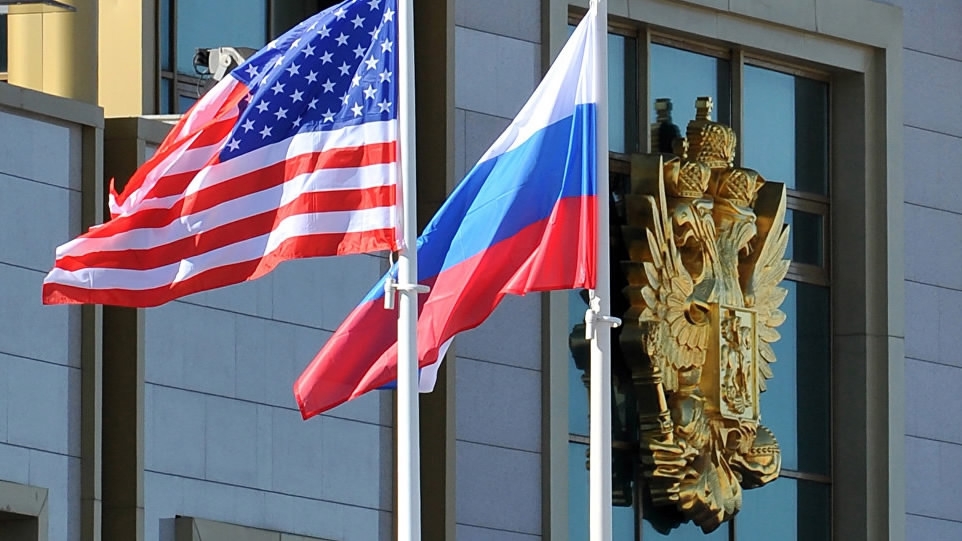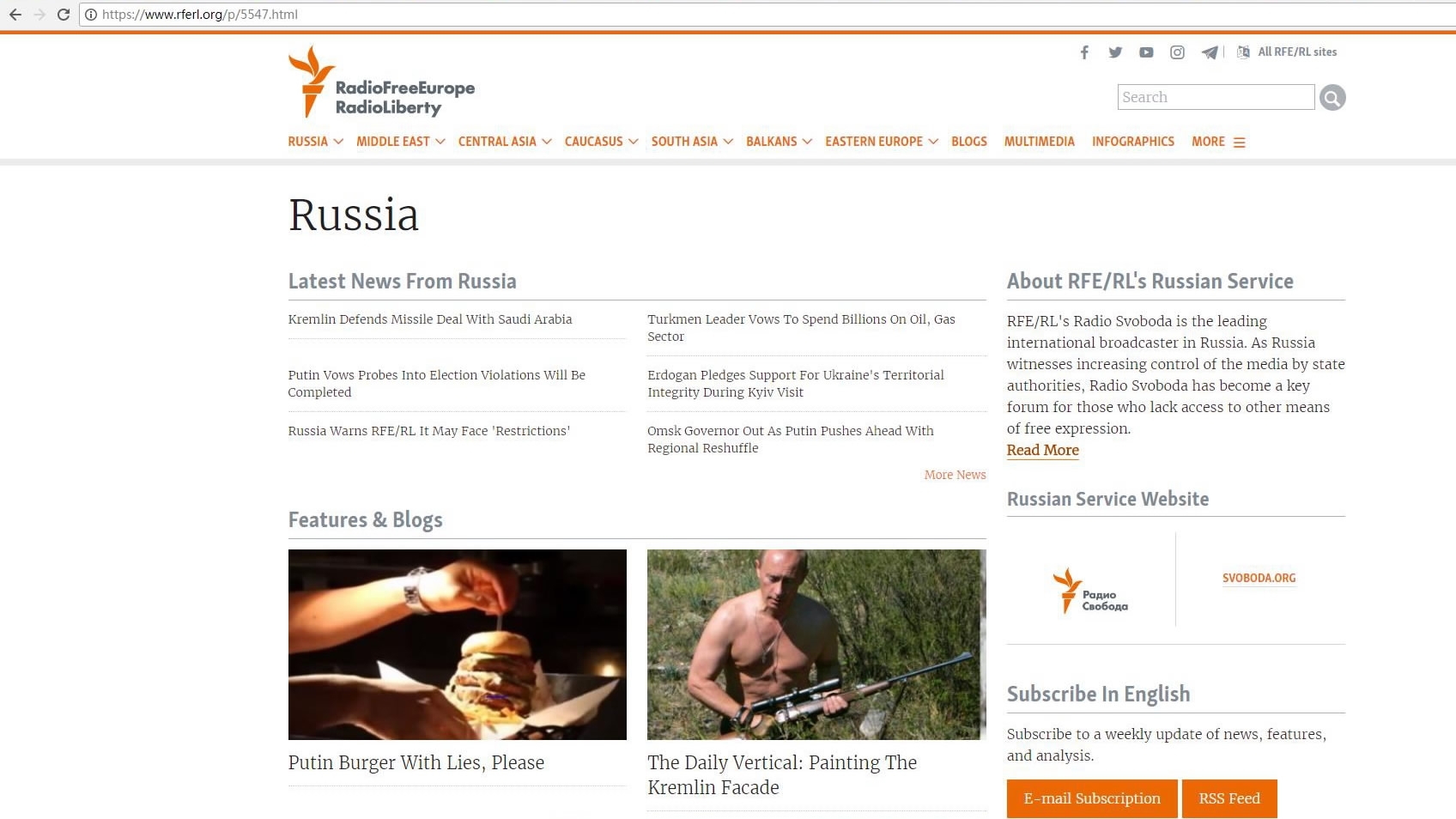
World
15:53, 10-Oct-2017
Russia-US media war: Who will blink first in battle of diplomatic wits?
Abhishek G Bhaya

The ongoing ‘media war’ between the US and Russia got fiercer on Monday with Moscow threatening US media operating within its territory with new legal restrictions, while Google claimed it has found evidence that Russian operatives interfered in 2016 US presidential election by exploiting its platforms.
The Russian justice ministry on Monday served notice to "a number of US media operating in Russia" warning them of the "unacceptability of breaching Russian law," its press service said in a statement quoted by Interfax news agency.
The ministry in its notice to Washington-funded Radio Free Europe/Radio Liberty (RFE/RL) warned that the broadcaster’s activity falls under Article 2 of the Russian Federal law on NGOs, which regards its operations as those of a foreign agent.

A screenshot of Radio Free Europe/Radio Liberty's official website.
A screenshot of Radio Free Europe/Radio Liberty's official website.
The “tit-for-tat” move comes in response to a similar notice by US justice department to Russian state-funded media last month demanding them to register as foreign agents under the Foreign Agents Registration Act (FARA).
The Russian justice ministry’s letter to RFE/RL, cited by various news media, stated that under the federal law, Moscow can impose restrictions on the activities of the US-funded broadcaster in Russia.
Several services of the broadcaster, including its Russian-language network Current Time television, run in cooperation with Voice of America, as well as RFE/RL's Russian service Radio Svoboda, might be subjected to certain restrictions, reported Russian broadcaster RT, which was last month served an identical notice in the US that prompted Moscow’s retaliation.
Identical retaliation
The justice ministry admitted in its letter that its move is a “tit-for-tat measure for the oppression of the Russian media in the US,” and that Washington’s action toward Russian media in the US will determine its future course.
Moscow’s move of using a law, which was passed in 2012 and that has not been used against media so far, is nearly identical to Washington imposing FARA on RT and Russian state-funded Sputnik news agency.
Until now media and news organizations had been specifically exempted from FARA, which was devised in 1938 to counter pro-Nazi agitation in US soil.

Margarita Simonyan, editor-in-chief of Russian broadcaster RT, interacts with the media, with the Cathedral of Christ the Saviour seen in the background, in Moscow, Russia, on October 17, 2016. /Reuters Photo
Margarita Simonyan, editor-in-chief of Russian broadcaster RT, interacts with the media, with the Cathedral of Christ the Saviour seen in the background, in Moscow, Russia, on October 17, 2016. /Reuters Photo
Last Thursday, RT’s editor-in-chief Margarita Simonyan, in her submission to a Russian parliamentary panel, claimed her network is being forced to quit US after the justice department demanded RT’s American branch to register as foreign agent. The channel has been given a deadline of October 17 to register under FARA.
"What they [Washington] have been doing in regard to us is tantamount to driving us out of the country. They put us in conditions in which we cannot work," Simonyan was later quoted as saying in an interview with Russia's NTV channel.
She added that “if worst comes to worst” her channel “will leave the US and no longer broadcast there,” adding that “Russia would respond in kind as to American media.”
Kremlin has slammed the "unprecedented pressure" on RT in the US while Russian Foreign Ministry’s spokesperson Maria Zakharova on Friday warned of “tit-for-tat measures” that could involve a total “broadcast ban” for the US media, including private outlets.
American broadcaster CNN International has been given a deadline of October 11 to “eliminate violations” uncovered by Roskomnadzor, Russia’s federal supervisory agency for media, IT and communication; or else it may lose its broadcasting license.
Google probing Russian-backed ads

The Google logo is pictured atop an office building in Irvine, California, US, on August 7, 2017. /Reuters Photo
The Google logo is pictured atop an office building in Irvine, California, US, on August 7, 2017. /Reuters Photo
In the US, Russian media is being put under pressure over their alleged role of meddling in the 2016 US presidential campaign.
The US stand was bolstered on Monday as Google claimed it has "found that tens of thousands of dollars were spent on ads by Russian operatives who aimed to spread disinformation [across Google's products such as Gmail, Youtube and DoubleClick ad network],” according to a report in The Washington Post.
“Google investigators found 4,700 US dollars in ads tied to the Russian government, according to a person familiar with the matter. The company discovered another 53,000 US dollar in ad spending coming from Russia that it’s scrutinizing further to determine whether it’s connected with state-sponsored accounts or legitimate ad spending by Russian businesses,” the report said.
Google later told AFP that it is "taking a deeper look to investigate attempts to abuse our systems, working with researchers and other companies, and will provide assistance to ongoing inquiries."
While other social media platforms such as Facebook and Twitter have already revealed similar publicity content financed by Russian interests, Google up until now had maintained that it was not used in the alleged Russian bid to manipulate the US polls.
Executives from Facebook, Twitter and Google have been asked to testify about Russian meddling in the 2016 US election before a House of Representatives panel on November 1.
US lawmakers, as well as justice officials, are investigating whether Russia covertly interfered with the election or aided Donald Trump's successful presidential campaign. Moscow has persistently denied the charges.
The media spat seems to be set for a long-drawn battle of diplomatic wits, with both Russia and the US expecting the other to blink first.
(With input from agencies)
Related story: RT, CNN bear the brunt in Russia-US ‘media war’

SITEMAP
Copyright © 2018 CGTN. Beijing ICP prepared NO.16065310-3
Copyright © 2018 CGTN. Beijing ICP prepared NO.16065310-3